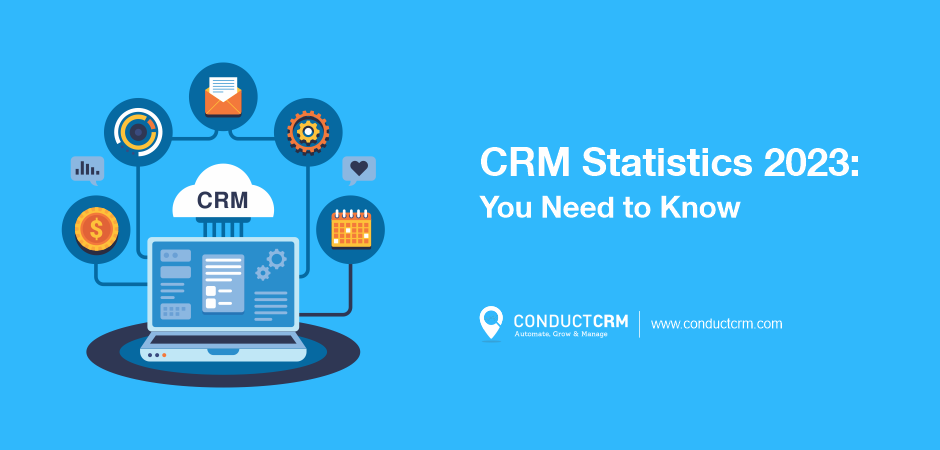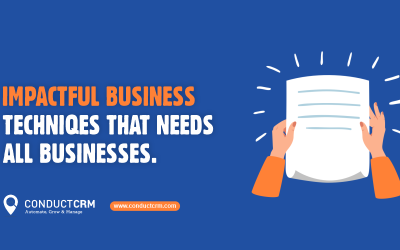CRM Statistics 2023: You Need to Know
Introduction
The main objective of any business is continuing growth in getting new customers and generating more revenue than last year. And that’s where CRM(Customer Relationship Management) comes into the picture.
CRM software helps you to generate or develop a long-lasting relationship with current customers and engage with potential customers.
With the growing economy of the world businesses need to adjust to the new trends and CRM software helps you to connect with customers more effectively which results in the growth of your businesses.
Looking for more ways to boost your revenue subscribe to our LinkedIn newsletter.
Contents:
- Statistics of Mobile CRM
- Cloud-based CRM statistics
- CRM usage statistics for 2023
- CRM benefits statistics
- Customer Experience Statistics
- Sales Statistics
- Return on Investment Statistics
- Benefits of CRM technology and processes
- Recent CRM Adoption and usage trends
- FAQs
What is the Future of CRM?
The latest statistics and trends strongly suggest that CRM has a very promising future. Technologies such as artificial intelligence(AI), the Internet of Things (IoT), and big data becoming more integrated with CRM. We can expect more transformation in the world of CRM software.
At the same time, CRM growth seems to be resilient, showing no signs of stopping even during the COVID pandemic peak. If you want to connect your businesses with CRM then first you should know the future of CRM. So, here are some CRM statistics that you should know in 2023.
1) Statistics of Mobile CRM
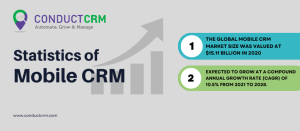
Mobile CRM usage is expected to continue to grow in 2023, as more businesses recognize the benefits of being able to access customer data from anywhere at any time.
According to a report by Grand View Research, the global mobile CRM market size was valued at $15.11 billion in 2020 and is expected to grow at a compound annual growth rate (CAGR) of 10.5% from 2021 to 2028. Furthermore, a study by Nucleus Research found that mobile CRM increases productivity by an average of 14.6%.
2) Cloud-based CRM Statistics
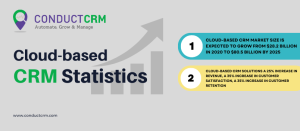
Cloud-based CRM solutions are becoming increasingly popular due to their ease of use, cost-effectiveness, and scalability. According to a report by Markets and Markets, the global cloud-based CRM market size is expected to grow from $28.2 billion in 2020 to $80.5 billion by 2025, at a CAGR of 23.2% during the forecast period.
Additionally, a study by Salesforce found that companies that use cloud-based CRM solutions experience the following:
- 25% increase in revenue
- 35% increase in customer satisfaction
- 35% increase in customer retention
3) CRM Statistics for Usage in 2023
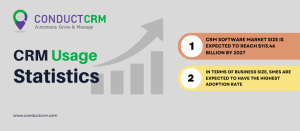
CRM usage is expected to continue to grow across different industries and businesses.
According to a report by Statista, the global CRM software market size is expected to reach $113.46 billion by 2027. The report also found that the financial services industry is expected to have the highest growth rate in CRM adoption, followed by healthcare and retail.
In terms of business size, small and medium-sized enterprises (SMEs) are expected to have the highest adoption rate of CRM software in 2023.
4) CRM Benefits Statistics
CRM software provides numerous benefits to businesses, including increased productivity, improved customer satisfaction, and better customer retention rates.
- According to a report by Nucleus Research, companies that use CRM software experience an average return on investment (ROI) of $8.71 for every dollar spent.
- Additionally, a study by Salesforce found that businesses that use CRM software experience an average of 45% increase in customer retention rates and a 56% increase in customer satisfaction.
5) Customer Experience Statistics
In 2023, businesses are expected to focus more on improving customer experience (CX) through the use of CRM software.
According to a report by Gartner, 89% of companies expect to compete primarily on CX in 2023.
A study by Aberdeen Group found that companies with strong CX strategies achieve a 17% growth in revenue, compared to only 3% for companies with weak CX strategies.
6) Sales Statistics
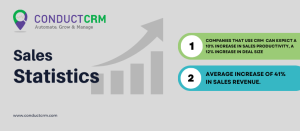
CRM software can help businesses improve their sales performance by providing valuable insights into customer behaviour and preferences.
According to a report by HubSpot, companies that use CRM software can expect:
- 10% increase in sales productivity
- 12% increase in deal size
Additionally, a study by Nucleus Research found that companies that use CRM software experience an average increase of 41% in sales revenue.
7) Return on Investment Statistics
The ROI of CRM software can vary depending on the size of the business and the industry. According to a report by Nucleus Research, the average ROI of CRM software is $8.71 for every dollar spent.
Furthermore, a study by Salesforce found that companies that use CRM software experience an average of 45% increase in customer retention rates and a 56% increase in customer satisfaction.
8) Benefits of CRM Technology and Processes
CRM technology and processes provide numerous benefits to businesses.
According to a study by Forrester, companies that use CRM software experience an average of 3.7 times increase in customer retention rates, and a 2.4 times increase in customer satisfaction.
Additionally, a study by Nucleus Research found that CRM software can increase productivity by an average of 14.6%.
9) Recent CRM Adoption and Usage Trends
-
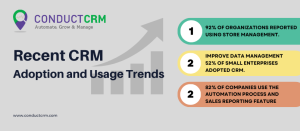
-
A report from SoftwareAdvice shows that contact management, schedule reminders and interaction tracking are the most demanded CRM software feature.
-
A study by GDMA says that 92% of organizations reported using store management.
-
According to Workbooks, to improve data management 52% of small enterprises adopted CRM.
-
82% of companies use the automation process and sales reporting feature of CRM – According to Grandview Research
CRM software is becoming increasingly important for businesses in 2023. The use of CRM technology and processes provides numerous benefits to businesses, including improved customer relationships, increased productivity, and better data management. By staying informed about the latest CRM statistics and trends, businesses can make informed decisions about which CRM solutions to invest in, and how to optimize their use of CRM software to achieve their business goals.
Are you interested in implementing these CRM Statistics in your organization?
With a leading CRM platform, ConductCRM can help you to manage your entire sales pipeline from initial brand awareness to conversion. Our CRM software has features to track leads, with website and mobile application management, product and service management, lead distribution, Email/SMS integration, payment tracking, etc.
Connect to us and feel free to ask. Also, book your FREE DEMO with us.
FAQs
1) Is CRM market growing?
Yes, the CRM market is growing rapidly. As we mention above according to a report by Grand View Research, the global CRM market size was valued at $43.7 billion in 2020 and is expected to grow at a CAGR of 14.2% from 2021 to 2028.
2) Why CRM is successful?
CRM is successful because it helps businesses improve their customer relationships, increase sales performance, and enhance overall business operations.
3) How big is the CRM market?
The global CRM market is large and growing. According to a report by Grand View Research, the global CRM market size was valued at $43.7 billion in 2020 and is expected to grow at a CAGR of 14.2% from 2021 to 2028.
4) What industries use CRM most?
CRM software is used in a wide range of industries, including healthcare, financial services, retail, manufacturing, and many others to manage customer relationships, automate sales processes, and improve collaboration across different teams.
